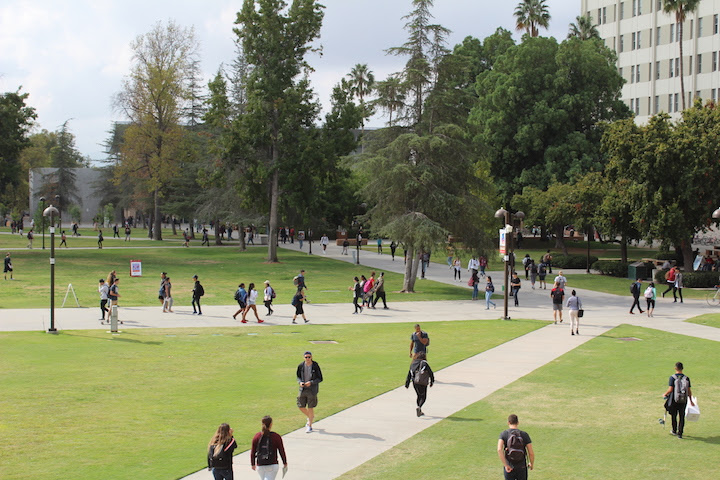
Black teachers: How to recruit them and make them stay

Lessons in higher education: What California can learn

Keeping California public university options open

Superintendents: Well-paid and walking away

The debt to degree connection

College in prison: How earning a degree can lead to a new life

California has set an example for the United States in college remediation reform.

Alexandra Logue
There has been some faculty resistance, but at the same time, bold reform action in the form of AB705 from the California Legislature concerning the California Community Colleges, plus an executive order of the chancellor of the California State University System. These actions respond to the greatest academic challenge for college students: succeeding in traditional, prerequisite, noncredit remedial classes, particularly in mathematics. The majority of new U.S. postsecondary students are assessed as needing math remediation but the majority of such students do not complete it, making graduation impossible.
There is an alternative, one now being adopted widely in California: corequisite remediation — which consists of students taking college-level courses with extra support. There have been many reports of increased completion of college-level math requirements with corequisite remediation.
However, it could be argued that these studies did not involve controlled research designs and that students taking corequisite remediation and the faculty who teach those courses are different from students and faculty participating in traditional remediation and that is why the students’ pass rates differ in the two types of courses.
To address this concern, we conducted a randomized controlled trial at three City University of New York (CUNY) community colleges. We randomly assigned new associate-degree students to college-level statistics with extra support (corequisite remediation) or to elementary algebra (traditional, prerequisite, math remediation), with the same faculty teaching both. All students had been assessed as needing math remediation and none of their majors required college algebra. All students had to pass a college-level quantitative course in order to graduate. The results: 56 percent of the students passed statistics, but only 39 percent passed elementary algebra. Students with a wide range of placement test scores benefited from the corequisite approach. These results were published in 2016 in a refereed journal and passed the rigorous criteria for inclusion “without reservations” in the federal Department of Education’s What Works Clearinghouse.
But, some people argued, the statistics course contains different material from elementary algebra. Statistics may not sufficiently prepare students for other courses. To address this concern, we followed the students’ academic performance for three years. During that period, in comparison to the traditional remediation students, the statistics students accumulated more college credits, were as likely or more likely to pass each of CUNY’s eight general education (core curriculum) categories (including in social and natural sciences), were more likely to pass advanced math courses and were more likely to graduate (by 8 percentage points). Almost none of the students in either group switched to a major requiring college algebra.
Further, because students from underrepresented groups are more likely to be assigned to remediation and because our course pass rates and graduation rates did not differ according to students’ race/ethnicity, this corequisite remediation approach can help close racial/ethnic academic performance gaps.
In sum, the theory that college students need to pass elementary algebra tests in order to succeed in college courses involving quantitative skills and graduate is, simply, wrong. In addition, algebra is not needed for most jobs following college.
Despite such evidence, some recent articles and research proposals concerning remediation have muddied the waters by omitting reference to the many previous studies supporting corequisite remediation, thus conveying the mistaken impression that effectiveness of corequisite remediation is still unproven. This, not surprisingly, has caused some college faculty members to oppose remedial math reform. But they are not necessarily aware of all the evidence that backs remediation reform.
More research is always needed. However, we should all state clearly that the converging evidence supports corequisite over traditional remediation. At stake is the success of tens of thousands of students each year, in California and beyond.
•••
Alexandra W. Logue is a research professor at the Center for Advanced Study in Education, Graduate Center, The City University of New York and the author of Pathways to Reform: Credits and Conflict at The City University of New York.
The opinions expressed in this commentary represent those of the authors. EdSource welcomes commentaries representing diverse points of view. If you would like to submit a commentary, please review our guidelines and contact us.

Panelists discussed dual admission as a solution for easing the longstanding challenges in California’s transfer system.

A grassroots campaign recalled two members of the Orange Unified School District in an election that cost more than half a million dollars.

Legislation that would remove one of the last tests teachers are required to take to earn a credential in California passed the Senate Education Committee.

Part-time instructors, many who work for decades off the tenure track and at a lower pay rate, have been called “apprentices to nowhere.”
Comments (5)
Comments Policy
We welcome your comments. All comments are moderated for civility, relevance and other considerations. Click here for EdSource's Comments Policy.
Margaret Bwogi 5 years ago5 years ago
Although the decision may seem sound, the argument that ‘most students do not need Algebra in their fields anyway..’ is sad coming from an educator who must be aware that the main gusto behind breadth courses is that students become more advanced in their critical analysis. This is particularly important as they progress toward managerial positions and take on more responsibility.
Kyle Chang 5 years ago5 years ago
Remedial education is a waste of time!
Jack 6 years ago6 years ago
To strengthen the argument, a round of testing should be used in which the stat students do not get the corequisite treatment while the algebra students do get it to see if there are still gains based on the difference in delivery and support rather than the content.
Christopher Sessums 6 years ago6 years ago
Remedial ed points to a larger problem: We’re putting unqualified teachers in front of students. What if instructors were required to be competent in teaching before assigning them courses to teach? What if math courses were designed with at-risk students in mind first? Heavy sigh …
justmom 6 years ago6 years ago
How about we go back to teaching math in high school? Crazy idea? Look at the multimillion dollar math tutoring industry. Just contract tutors to teach the kids using the latest assessment software to pinpoint the skills deficiencies and address those topics with each child. It's likely to be cheaper and more effective than the ridiculous nonsense going on right now. High schools should only be assessing students that aren't being privately tutored. That would be the … Read More
How about we go back to teaching math in high school? Crazy idea?
Look at the multimillion dollar math tutoring industry. Just contract tutors to teach the kids using the latest assessment software to pinpoint the skills deficiencies and address those topics with each child.
It’s likely to be cheaper and more effective than the ridiculous nonsense going on right now.
High schools should only be assessing students that aren’t being privately tutored. That would be the only way to accurately measure the school’s success or failure.